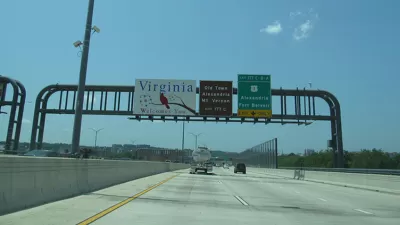Making up only seven percent of U.S. interstate miles, the future of toll roads is bright according to Brooking's Robert Puentes and Diane Rehm's other guests in a 52-minute, wide ranging discussion on gas taxes, toll roads, and privatization.
Chris Edwards of the Cato Institute explains that the recent increase in toll road miles results from the lack of sufficient federal transportation funding, particularly the decision to not increase the federal gas tax since 1993. "I think it's fundamentally our refusal to pay for things we value and need," he states.
Donald Cohen of In the Public Interest elaborates, believing that people will pay for what they need, but "when you talk about taxes, it becomes a political issue that is used....to make it difficult to take action."
In addition to panelists Puentes, Edwards, and Cohen, Rehm speaks with call-in guests Ed Rendell of Building America’s Future and Bill Graves of the American Trucking Associations.
No one likes raising taxes, but the cost of doing nothing is incredible," states Rendell.
Perhaps the best part of the show, though, are the listener call-ins who, for the most part, are opposed to tolling and privatization. A caller noted that Germany has no toll roads or bridges, though the Autobahn began tolling trucks in 2003 and Autobahn tolls are applied in Austria and Switzerland. Of course, gas taxes are much higher in Europe as well.
My favorite was a caller from Chelsea, Michigan:
Is there any difference in the quality of toll roads and freeways? Here in Michigan when we go to Chicago, we notice that the excellent toll roads there are so beautiful that we wondered if they were made to last longer. Are toll roads better built?
Edwards responds that private companies have more of an incentive to maintain roads they operate, and build them better if they have a design, build, operate and maintain, long term contract.
Puentes adds that the "states with the most toll road miles are, in order, Florida, Oklahoma, Pennsylvania and New York [see map]," and suggests listeners make their own assessment of the quality of those roads.
Discussions touch on topics mentioned here recently, including the Capital Beltway, the bankruptcy of the Indiana Toll Road but the interest in investing in it, and the widening of the New Jersey Turnpike; only the latter being an investment by a public entity, as opposed to a public-private partnership.
Puentes indicates the $2.5 billion investment was funded by the NJ Turnpike Authority's issuance of revenue bonds, "and they raised the tolls on the turnpike," he notes.
Correspondent's note: Other Diane Rehm shows posted here include "Reasons and Options for Shrinking Cities" and "Creating Livable Cities."
FULL STORY: The Future Of Toll Roads In The U.S.

Maui's Vacation Rental Debate Turns Ugly
Verbal attacks, misinformation campaigns and fistfights plague a high-stakes debate to convert thousands of vacation rentals into long-term housing.

Planetizen Federal Action Tracker
A weekly monitor of how Trump’s orders and actions are impacting planners and planning in America.

San Francisco Suspends Traffic Calming Amidst Record Deaths
Citing “a challenging fiscal landscape,” the city will cease the program on the heels of 42 traffic deaths, including 24 pedestrians.

Defunct Pittsburgh Power Plant to Become Residential Tower
A decommissioned steam heat plant will be redeveloped into almost 100 affordable housing units.

Trump Prompts Restructuring of Transportation Research Board in “Unprecedented Overreach”
The TRB has eliminated more than half of its committees including those focused on climate, equity, and cities.

Amtrak Rolls Out New Orleans to Alabama “Mardi Gras” Train
The new service will operate morning and evening departures between Mobile and New Orleans.
Urban Design for Planners 1: Software Tools
This six-course series explores essential urban design concepts using open source software and equips planners with the tools they need to participate fully in the urban design process.
Planning for Universal Design
Learn the tools for implementing Universal Design in planning regulations.
Heyer Gruel & Associates PA
JM Goldson LLC
Custer County Colorado
City of Camden Redevelopment Agency
City of Astoria
Transportation Research & Education Center (TREC) at Portland State University
Jefferson Parish Government
Camden Redevelopment Agency
City of Claremont




























